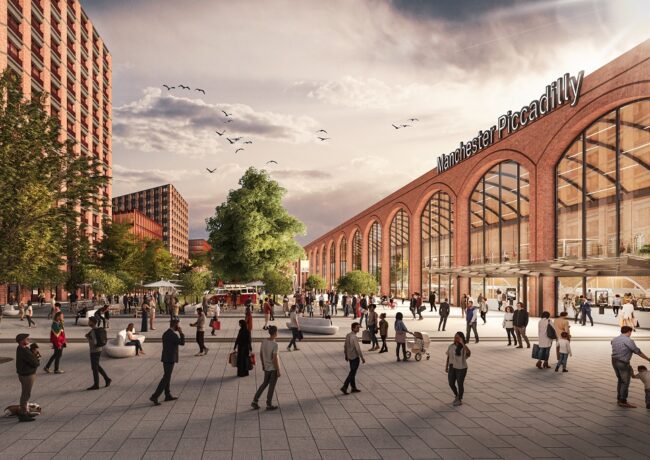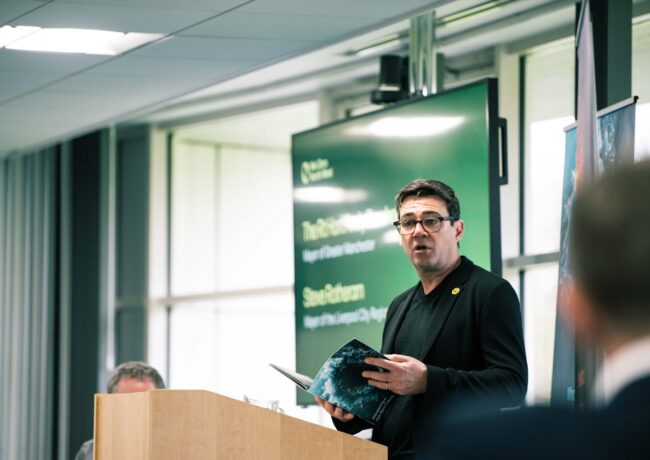NW in 2018 | Moving forwards in Greater Manchester
It has been a very busy year working in transport in Greater Manchester and 2018 looks set to be even busier, writes Nicola Kane of Transport for Greater Manchester.
This year was dominated by the election of Andy Burnham as Greater Manchester’s first Mayor, with a major focus on his transport portfolio. He has already appointed Chris Boardman as his cycling and walking commissioner, and introduced half-price bus tickets for 16-18 year olds, which is being followed by the introduction of half price tram tickets for the same age group in January.
Another major landmark was the launch of the 2040 Transport Strategy in February, setting out Greater Manchester’s long-term aspirations for delivering a more integrated and customer-focused transport system.
This year also saw the completion of more elements of our major transport infrastructure programme, with the opening of a new city centre Metrolink line and flagship tram stop at St Peter’s Square, as well as a new state-of-the-art transport interchange at Bolton and a radical reimagining of Manchester’s Oxford Road corridor. We welcomed some major new additions to our transport system, including Mobike which, in spite of some early teething problems, has proven incredibly popular.
And there are more big issues on the horizon for 2018.
Housing delivery looks set to continue to dominate headlines and the planned publication of a new draft Greater Manchester Spatial Framework will focus attention on local delivery priorities. We will continue to work closely with local authorities to understand and address the transport implications of the new plan, building on the framework for sustainable growth we’ve set out in Greater Manchester’s 2040 Transport Strategy. This will include further investigation of the potential for maximising housing delivery close to rail stations and other transport hubs and working with districts on their long-term aspirations for town centre regeneration.
Greater Manchester will also be running a number of cutting-edge demonstrator projects working with national and European partners to understand the potential implications of new technologies for our future transport system. This includes an InnovateUK project to trial autonomous vehicles on the new A6 to Manchester Airport relief route, prior to it opening later in 2018, and running autonomous pods at Manchester Airport. We’ll also be further extending our network of electric vehicle charging points across the conurbation.
Transport for the North will become the first statutory sub-national transport body and will publish its strategic transport plan setting out its long-term priorities to 2050 and an outline investment plan, making the case for long-term investment in transport to help rebalance the national economy. In Greater Manchester, we have been preparing our long-term growth strategies to maximise the benefits from the arrival of HS2 and Northern Powerhouse Rail at Piccadilly and Manchester Airport, and we have further growth strategy work planned next year with Stockport and Wigan.
Although 2017 parliamentary activity was dominated by Brexit negotiations, we also saw the enactment of the unglamorous but very important Bus Services Act. The Act gives mayoral authorities powers to reform the bus market and we are currently exploring how this could help us achieve Greater Manchester’s ambition for bus services, which account for three in every four local public transport journeys. Andy Burnham has committed to using these powers to “make bus services more affordable, more reliable and more accessible” and reforming bus services will be essential to delivering a truly integrated local public transport network and fares and ticketing system.
Improving air quality and congestion will continue to be a key focus for us and for Andy Burnham. We will be developing plans with our partners to address both issues, drawing on feedback received from over 7,000 respondents to the Mayor’s congestion conversation this autumn. Tackling these major issues will require a collective effort, understanding what national and local government, transport operators, businesses and individuals can all do to help reduce the negative impacts of traffic and congestion on our economy, quality of life and environment.
One key opportunity will be to encourage more of the 1.8 million short trips of 1km or less to be made on foot and by bike. Working with Chris Boardman, we’ll be developing a cycling and walking strategy and supporting infrastructure plan for Greater Manchester, which will set the scene for continued investment in active travel infrastructure and measures to encourage their uptake.
- Nicola Kane is head of strategic planning and research at Transport for Greater Manchester
The North West in 2018 series features guest contributors looking ahead to next year and is published throughout December.





Opening the bridge that Peel refuse to open by the Trafford Centre would be a good start to reduce the daily gridlock and pollution from the needless traffic jam. Real solutions rather than reports or strategies!
By Bridge disaster
Whoever decided to produce a transport strategy to 2040 without first seeing how much development, and in what locations, would be proposed through GMSF should be considering if they’re in the right job.
By Anonymous